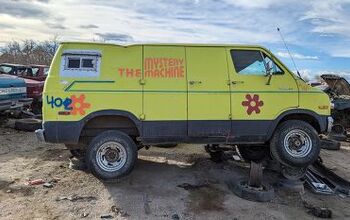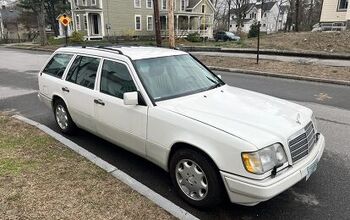Editorial: Ford Death Watch 48: Branding Isn't Everything
It’s been a while since we’ve run a Ford Death Watch. Which doesn’t mean Ford isn’t dying. It is. It’s just dying more slowly and less spectacularly than GM and Chrysler. In fact, Ford’s head-faked the press. They’ve convinced the pundocrats that The Blue Oval Boys don’t need federal bailout bucks to survive. Oh what the Hell, FoMoCo CEO Alan Mulally just about told Congress, as you’re offering… we might as well accept. In truth, the Detroit’s last man standing is about to hit the pavement just as hard as its cross-town co-conspirators.
Tomorrow, the injury will be audible– and not just in the halls of Congress. Ford’s November sales stats will go splat. Ford analyst George Pipas will seek shelter in metal-moving relativism. Just as Ford proudly trumpets the fact that their cars are nearasdammit as reliable as Toyota’s, Pipas will claim that Ford’s sales drop is nearasdammit as bad (i.e. good) as Toyota’s. Which will be both true and irrelevant.
All things being negative, ToMoCo is still on track to bank $5b in profit this year. Meanwhile, Ford shed $2.6b in Q3, burning through $7.7b of its cash pile. So forget Toyota. General Motors is the more appropriate comparison. And there are only two significant differences between Ford’s plight and that of GM: scope and scale.
GM has eight U.S. brands, six of which need to die. Mazda excepted, Ford sells four brands in the U.S., two of which need to die. GM has around 6550 dealers, 5k of which need to die. Ford has around 4k dealers, 3k of which need to die. Meanwhile, Ford and GM are struggling under the weight of identical labor contracts, desperately trying to shed plants and jobs. In short, as goes GM, so goes Ford.
Commentators— and Ford— like to point out that The Blue Oval Boys are in less danger of running out of cash than GM. Truth be told, the danger’s the same; only the time line varies. Ford’s decision to stock-up on money before the current fiscal meltdown– mortgaging everything up to and including their logo– was either the smartest move the company ever made or the luckiest. Or both. But it doesn’t alter the end result. Unless Ford starts taking in more money than it spends, it’s going to go bankrupt.
As Ford CEO Alan Mullaly bellies-up to the Congressional bailout bar, he’ll parrot GM’s claim that numbers alone don’t tell the story. Right-sizing, on track, bridge loan, bright future, new products, fuel efficiency, world platform, economic downturn, yada yada yada. As the only American automaker with a plausible turnaround tale to tell (which isn’t saying much), Ford will get the money. After all, Congress wants to save SOMEONE in the American auto industry.
Whether or not the feds re-stoke Ford’s coffers and/or help it reduce its overheads, FoMoCo’s comeback is destined for failure, for one reason: branding. Ford doesn’t have any.
Quick: what’s Ford’s slogan? Drive Quality, Drive Green, Drive Safe, Drive Smart or Drive One? Yes. The latter is Ford’s ur-slogan, which says, well, nothing. Given the ailing American automaker’s product overlap, the company’s call to arms might as well be “pick one.” Edge, Flex, Taurus X or Escape?
Make no mistake: this is no small matter. If Ford is to survive, it must come-up with a compelling reason to buy a Ford instead of anything else.
Reliability? Toyota. Resale value? Honda. Price? Hyundai. Stress-free shopping? Saturn. Buy American? Only if you’re thinking continentally. In today’s mixed media world, a car company without tightly-focused branding is like a twenty dollar bill that’s been bleached white in the wash.
Ford’s anodyne anonymity doesn’t end there. Lincoln’s “Reach Higher” slogan– a not-so-subliminal slam at working class buyers– reflects the luxury brand’s lack of a coherent product or marketing plan. And if that’s not enough to convince you that Ford doesn’t “get it,” Lincoln’s farrago of MK monikers illustrates the point nicely. As do the vehicles themselves: a range of tarted-up Fords whose excellence is there for no one to see.
Legislators are not likely to concern themselves with such things. If products are the subject, mpgs are the answer legislators want to hear. If pushed, Mulally will argue that Ford’s 2010 Euro-style products will save both planet and company. Politicians will score some points for the folks back home, cross their fingers and sign the check.
But if the pols really wanted to protect the taxpayer’s money (as if), they’d remember that nobody ever submitted a business plan that ends in bankruptcy. The pols would focus on the fact that Ford’s future depends on its products, and products depend on their branding. Someone would look Mr. Mulally in the eyes and ask a simple question: what, sir, is a Ford?
More by Robert Farago
Latest Car Reviews
Read moreLatest Product Reviews
Read moreRecent Comments
- Kjhkjlhkjhkljh kljhjkhjklhkjh A prelude is a bad idea. There is already Acura with all the weird sport trims. This will not make back it's R&D money.
- Analoggrotto I don't see a red car here, how blazing stupid are you people?
- Redapple2 Love the wheels
- Redapple2 Good luck to them. They used to make great cars. 510. 240Z, Sentra SE-R. Maxima. Frontier.
- Joe65688619 Under Ghosn they went through the same short-term bottom-line thinking that GM did in the 80s/90s, and they have not recovered say, to their heyday in the 50s and 60s in terms of market share and innovation. Poor design decisions (a CVT in their front-wheel drive "4-Door Sports Car", model overlap in a poorly performing segment (they never needed the Altima AND the Maxima...what they needed was one vehicle with different drivetrain, including hybrid, to compete with the Accord/Camry, and decontenting their vehicles: My 2012 QX56 (I know, not a Nissan, but the same holds for the Armada) had power rear windows in the cargo area that could vent, a glass hatch on the back door that could be opened separate from the whole liftgate (in such a tall vehicle, kinda essential if you have it in a garage and want to load the trunk without having to open the garage door to make room for the lift gate), a nice driver's side folding armrest, and a few other quality-of-life details absent from my 2018 QX80. In a competitive market this attention to detai is can be the differentiator that sell cars. Now they are caught in the middle of the market, competing more with Hyundai and Kia and selling discounted vehicles near the same price points, but losing money on them. They invested also invested a lot in niche platforms. The Leaf was one of the first full EVs, but never really evolved. They misjudged the market - luxury EVs are selling, small budget models not so much. Variable compression engines offering little in terms of real-world power or tech, let a lot of complexity that is leading to higher failure rates. Aside from the Z and GT-R (low volume models), not much forced induction (whether your a fan or not, look at what Honda did with the CR-V and Acura RDX - same chassis, slap a turbo on it, make it nicer inside, and now you can sell it as a semi-premium brand with higher markup). That said, I do believe they retain the technical and engineering capability to do far better. About time management realized they need to make smarter investments and understand their markets better.


































Comments
Join the conversation
Re: Reliability and design Ronnie, You make a good point about designing an implementation of a technology. 'Stuff happens' is a deep truth (For those who may doubt that, consider the opposite statement for a moment and reflect on your view of the World if that were true). Systems in the real world are more complex than the systems we can model in the design process. Failures always have a statistical component and it is, as a practical matter, impossible to test long-tail situations. The story about your friend's death reminded me of a similar situation in my extended family. Many customers are willing to accept 'stuff happens' with some grumbling (and it is a rare person that does not grumble when bad luck arrives) if they feel it really was out of the control of the manufacturer. It seems quite plausible the proximate cause for head failure (and flying spark plugs) is improperly torqued spark plugs. I have no idea how the specified torque range compares with other engines and whether it is a reasonable expectation for real-world maintainers of vehicles -- including the shade tree mechanic -- to comply. It could be that Ford's engineers in effect demanded more precision on a common procedure than the average mechanic was likely to deliver. If so, is that a design flaw? I don't know. A car as a system is more than its components -- maintenance, available fuel, etc. are all part of it. Fussy vehicles, like some [s]women[/s] exotics, come to be known through their reputation for maintenance and are embraced, or not, with awareness a particularly knowledgeable and precise mechanic is required. The Ford brand, whatever it is, certainly does not have (or want) that feature. If cost constraints on engineers have forced them to designs that have little tolerance for 'errors', then I think there is a profound point about the expected reliability of the entire vehicle. Mercedes was, not so long ago, famous for reliability because they were 'overdesigned'. Many TTACers might agree that reputation is fading fast, if not already gone, because the drei-starr found they could make more money by cutting out the 'overengineering'. I remember Detroit in the 60s and 70s as not having such a reputation for sophistication or 'excitement' as compared to European brands. MGBs were far cooler than Mustangs. Rather it was that they were more reliable and sensible because they were not designed to the limit. Of course the sad point is that then, being designed to the limit always had the implication that it was to the limit of performance, not the lowest cost to manufacture. So, to summarize this off-topic discussion about reliability in a branding thread, I think we have come around to considering how perceptions of product reliability qua 'design flaws' may be an important part of the brand identity. Best, Michael